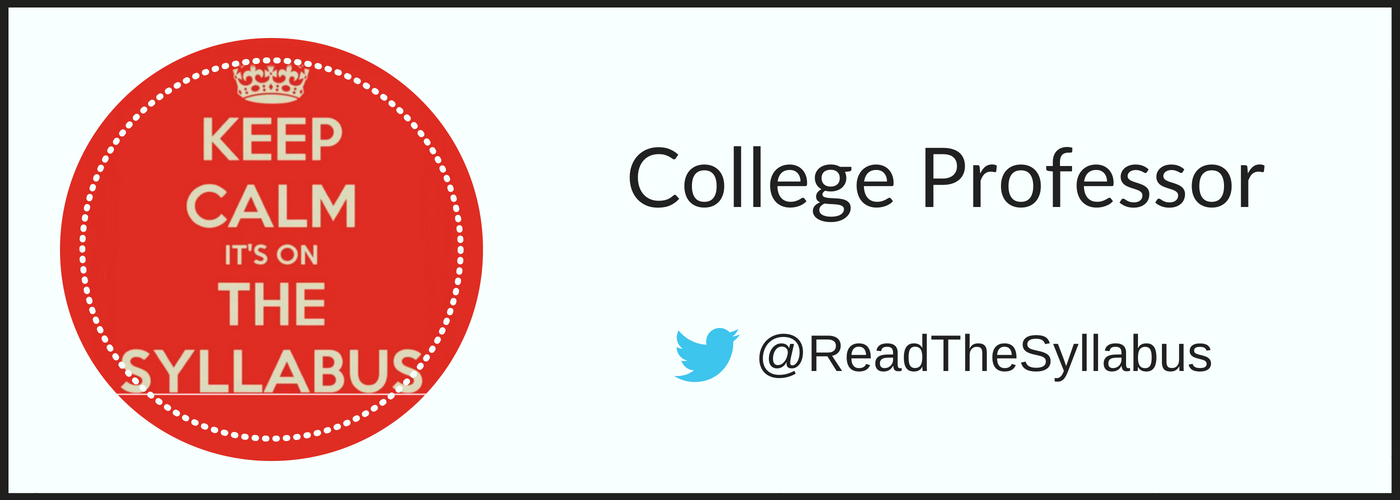Your Research. Your Life. Your Story.
A magnetic community of researchers bound by their stories
Every researcher has a story. What’s yours?
Have you read the syllabus lately?

This story has been shared by the academics behind the Twitter persona College Professor (@ReadTheSyllabus).
Imagine two instructors sitting around, working on a writing project, talking about students. Those two teachers have close to 40 years of combined instructional time. They have taught so many classes that they have lost count. They have connected with so many students that they look back at old Facebook and LinkedIn contacts and struggle to remember the student. In short, they are experienced, caring faculty.
And they are also frustrated. They are commiserating over students who don’t try, who won’t do the simplest thing, and yet complain about their grade and demand special consideration.
But they sincerely want their students to succeed. And to support this cause, they plot how to make their classes better, and they wonder how they can get the students to see that the projects and materials are selected to help THEM.
One of them goes home, starts a Twitter account, and sends it to the other as a spur of the moment idea while cooking dinner.
Yes, @ReadTheSyllabus really is a co-authored account. Like a good research project with multiple authors, it reflects an ongoing collaboration that has a mixed voice. True, it’s a distraction from real work, but we quickly learnt that this is alright. A distraction is needed sometimes.
When we created the account, for a while, it was strictly for us and a few bots. Shortly after, we found other academic voices, and they found us, and the number of our followers started to grow.
Along this journey, we have made several discoveries that seem quite amusing to some and sour revelations to others (which side of the continuum you fall on is completely up to you):
- Some students don’t like it when teachers read the syllabus to them at the start of a class.
- Some students hate it when teachers don’t post their syllabi until the last second before class.
- Oddly enough, there are other students who don’t like it when teachers assume that they have read the syllabus by themselves and just begin teaching.
- In a generation of instant answers, some students still send emails or ask professors verbal questions like “When is the test?” And they look rather insulted when we don’t shoot back with immediate answers (If only they knew how many classes and students we’re all simultaneously juggling! Make no mistake, we probably have to look at the syllabus ourselves to answer all their questions).
If you thought these were a little ridiculous then you’d better buckle up for more! Here’s why:
- Some students don’t like it when teachers wrap up a class early.
- Then there are other students who don’t like it when teachers stay for the class’ entire time.
- Some students don’t like it when classes are cancelled.
- But let’s not forget those students who surely don’t like it when classes are not cancelled (Picking these out from a crowd will be a no-brainer :D)
I’m sure you thought that there wasn’t room for more, but if you aren’t already amused, these last few will surely take you all the way:
- Students hate papers, tests, quizzes, lectures, ice-breakers (with a passion), speeches, and heaven forbid, if we ever ask them to introduce themselves in class! :D
- Students don’t like female teachers, male teachers, young teachers, or old teachers (I wonder what all of these people have in common!).
- Students believe that “Rate My Professor” can invoke the wrath of God upon a professor.
- And finally, some students like teachers that care, some don’t. (They ALL seem to like FREE food!)
I know what you’re thinking. And on most days, it sure seems like a minefield out there! But every now and then, we catch a glimpse of sunshine. We see it in students who are absolutely happy to be in class, in the ones that love to learn and want to work hard — in class and at hourly jobs, and they’re very happy when the instructor shuts down a disruptive student.
But I guess that the bottom line is — students don’t “Read The Syllabus” (in case you were wondering how we coined our Twitter handle). And as our colleagues would know, the syllabus provides us with insights and rules to succeed in our class. We write it to help, not to punish.
Over time we have tried to help others develop their syllabi and will continue to do so.
Ultimately we have come to believe that trying to please students in an era where everyone is trained to speak their mind even when it comes to complaining about things they don’t really like that much, is too tough a task.
Our advice to other professors — take feedback, look for ways to improve, listen to your colleagues, but ultimately, YOU ARE the expert in the room. Some will complain no matter what you do, so do what you believe to be the best.
Finally, we have been attacked in our DMs (direct messages) over the years by academics who believe that we hate students, that we should all be more positive and that our job is to do whatever we can, whenever asked to help students.
Maybe so, but could they look at the syllabus first?


Comments
You're looking to give wings to your academic career and publication journey. We like that!
Why don't we give you complete access! Create a free account and get unlimited access to all resources & a vibrant researcher community.

Your Research. Your Life. Your Story.
A magnetic community of researchers bound by their stories





